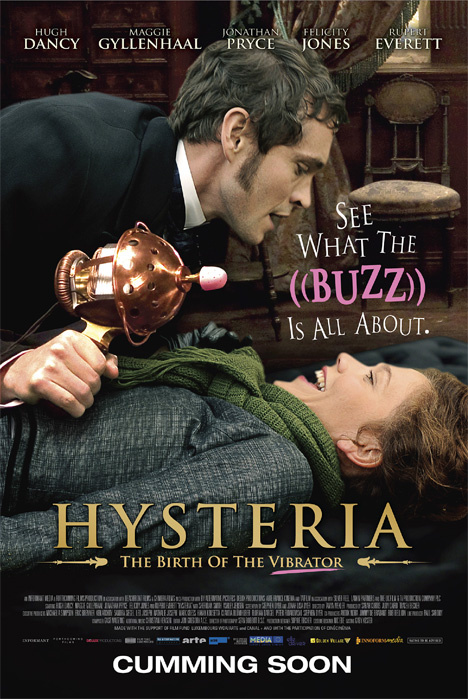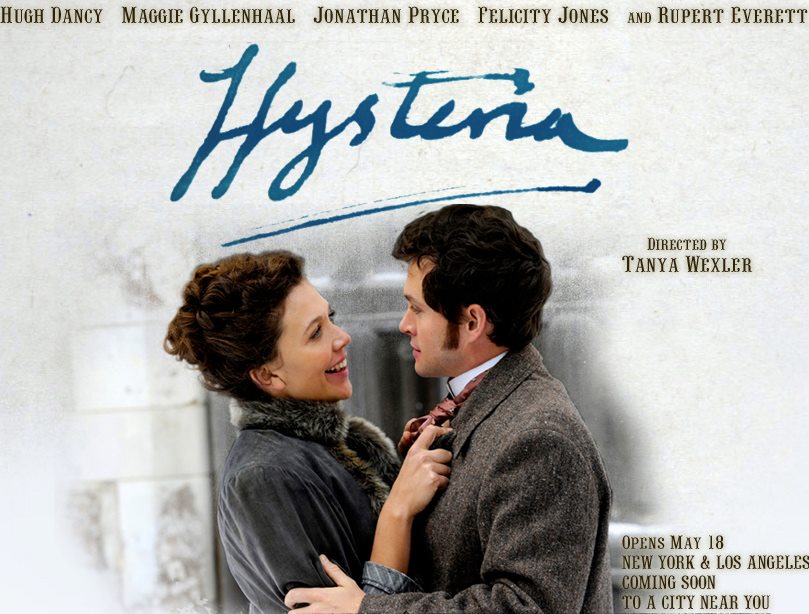
Hysteria is a riotous Victorian era comedy of errors which has as a central premise the invention of the first electromechanical vibrator by a young doctor in 1880’s London. A genuinely funny little movie which I hadn’t heard much about before (it came out towards the end of 2011), it helps that it is peopled with some warm, finely etched out characters and that these are brought to life by some good actors.
In London, 1880, the young Dr. Mortimer Granville (Hugh Dancy) is frustrated and out of another job. He is fed up of his senior doctors’ incompetence and refusal to keep themselves up to date on the latest medical advancements, and the same usually end up in arguments which get him fired. One of those ‘revolutionary’ ideas of the time which Dr. Granville espoused passionately was the thorough washing of hands with soap to make sure germs were got rid of (yes, even in pre-COVID times washing hands was a thing you see). Luckily for him, he does have a rich benefactor in Edmund St. John-Smythe (Rupert Everett) who is also an amateur inventor. Eventually, Mortimer does find gainful employment again with Dr. Robert Dalrymple (Jonathan Pryce), a doctor whose primary skills seems to involve treatments for relieving the bouts of ‘hysteria’ which his relatively wealthy female patients find themselves falling prey to every now and then. His treatment for it includes a slow and sensuous pelvic massage done in the woman’s genital area until she achieves what can be called a ‘paroxysm’. Or, in other words, a damn good orgasm. Hysteria as a legitimate diagnosis was abolished eventually in the 1950’s, but this is a story of how we started to get there. Dr. Dalrymple’s increasing clientele forces him to look for help, and he finds the perfect understudy in the young Dr. Granville. Soon, Dr. Granville becomes adept enough at his job that clients start requesting for his treatment specifically. Dr. Dalrymple sees potential enough in the young man that he tries to engineer an alliance between his younger daughter, the demure and obedient Emily (Felicity Jones) and Mortimer so that they can take the clinic forward. However, he didn’t account for the impact that his other daughter, Charlotte (Maggie Gyllenhaal), would make on the young doctor. Charlotte is what could be considered as the proverbial black sheep of the family, for the times the movie is set in. She is an unapologetic women’s suffrage movement activist (before the term even became fashionable) and she also doesn’t mind giving her father a piece of her mind when needs be. She rightfully deduces that her father’s ‘treatments’ are nothing more than succour for women who basically have unsatisfactory intimate lives with their partners and makes sure her father and Mortimer know this opinion. She also runs a home for the destitute and ailing, which relies on donations from her father or loans from other benefactors. Unfortunately, in light of her critical opinions on their actions and because her father finds it all a rather huge waste of time, the money is running out. Charlotte implores to Mortimer to respond to his true calling by helping out in the shelter, but he is wary of the disapproval of Dr. Dalrymple. Initially it appears that Charlotte induces nothing more than a strong confusion in him, but over time this coalesces into stronger emotions and we know where this will end up. Meanwhile, he develops cramps in his elbow from the excessive genital massages he has been giving out to the hysteria affected ladies of London andstops being able to do his job well. Almost inevitably, the sack awaits him.
It is at this time, while playing with an electric feather duster which his friend and benefactor St. John-Smythe had developed, that he gets the germ of the idea for an electric massager. The two friends develop the tool and decide to try it first on a prostitute turned housemaid, Molly. The success of the endeavour opens doors to creating what is now known as the vibrator. And perhaps to freeing Mortimer from the bounds of his ‘hysteria’ clinic and of tradition, and towards Charlotte and her home.

Look, this is not a movie to be taken seriously as a history lesson. Yes, it is loosely based on some real-life events and people, including the fact that a Dr Joseph Mortimer Granville did invent an electromechanical vibrator in the timeline specified in the movie. But he wasn’t exactly a dishy young man caught in the throes of romantic feelings for a feisty young social rights advocate. In fact, it appears he was a staid old man in his fifties, married, who wanted nothing much to do with curing women’s orgasms. Rather, his vibrator was more meant for the muscular massaging of men. It does get the part of women’s ‘paroxysm’ treatments right though. As per research, this was commonly diagnosed in women as far back as 2000 BC in ancient Egypt. The symptoms could include nervousness, insomnia, fainting or generally loud or irritating behaviour. The treatment too was administered in those ancient and pre-enlightened times for women’s sexuality up till relatively lesser ancient times.
Irrespective of the dubious historical correctness, this is a movie worth a watch for one of those days when you just want to kick back and indulge in a bit of Victorian comedy. The sets, cinematography and the acting are all well mounted and enacted but a special mention should go to Maggie Gyllenhaal. I’ve always been a fan of her, and here she lights up the screen whenever she is on it. A bubble of vivacious energy and confident wit, she plays a perhaps slightly anachronistic social reformer, but carries off her big scenes with some style. For those of you who are fans of her, I cannot recommend enough the brilliant eight-part mini-series from 2014, ‘The Honourable Woman’, made by Hugo Blick, which has to be one of the most gripping and well-made series I’ve watched on television.
As for this film, just kick back and let the delectable quasi-history of a lesser known kind indulge you. You probably won’t regret it.
